As an ancient form of entertainment, music holds a strange power over humans. It’s as old as when man learned new language forms and has kept evolving. As an entity, it has different purposes for various races and cultures.
Casino music remains a relevant factor in the evolution of gaming. Many people underestimate its importance on the mind. Whether in a traditional or online setting, it has a massive role in boosting casino revenues.
Many psychologists state that it influences a player’s mood and overall performance at gambling. From relaxing and energizing the mind to managing pain, gambling needs these features to survive.
This article discusses the history of casino songs and its evolution. We’ll trace the different genres to primary cultures and review the psychology of gamblers. It’ll end with an evaluation of the future and emerging trends for the modern setting.
The Origin of Casino Music: Tracing the Historical Journey
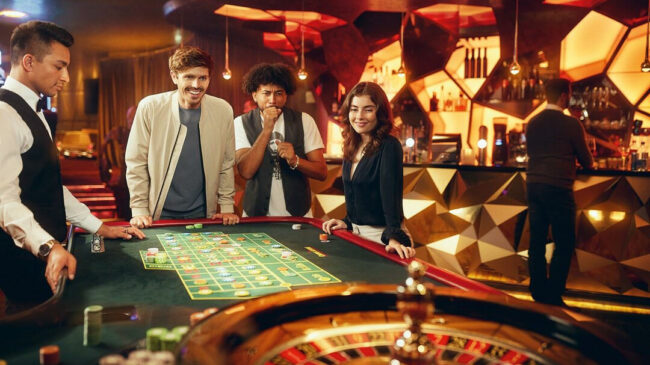
Music has been with casinos since they were first established in the 1900s. The term’ casino’ comes from an Italian word that refers to small country villas or clubs with an aim for entertainment. However, at the time, songs for dancing and listening were the main feature, and gambling was a side attraction.
Vintage casino establishments include the Newport Casino (US), Villa Farnese, and Villa Guila (Italy). The only settings available were theaters, which became dancing halls. You can trace the origin of the delicate blend of music and gambling to the United States.
It all began in salons, offering them singing events. In the mid-19th century, it became ragtime, including the Honky-Tonk piano. When the government decided to ban gambling in the 20th century, it slowed down its development. The culture became available only at illegal gambling and drinking places that allowed a specific music type, jazz.
Cities like New Orleans, Chicago, and San Francisco made the genre famous between the 1920s and 1930s. It was also when singers like Fletcher Henderson, Bing Crosby, Duke Ellington, etc., produced classic hits for the industry. However, casino music became widespread when Nevada made gambling legal in 1931.
During this time, Las Vegas grew popular as owners of the illegal casino business poured funding into big, luxurious hotels. The demand for singers who had full-time bands increased, making people like Elvis Presley and Frank Sinatra famous.
From jazz, Rock’n’Roll and Pop started becoming popular across the United States. The high energy forms and upbeat flavour offered more excitement. With it, electronic and ambient music has spread throughout Europe and the rest of the world.
The evolution records adjustments that allow different cultures to introduce native casino music sounds. Its effect provided a familiar environment and ensured players could gamble and swing in their native songs. This diversification became famous in 2010 and remains a current trend today.
| Country/Region | Time Period | Type of Music | Notes and Evolution |
| United States | Early 20th Century | Jazz, Big Band, Swing | Jazz was prevalent in the ’50s and ’60s; big band and swing earlier. |
| United States | 1970s – 1980s | Rock n’ Roll, Pop | Shift towards modern vibes with live acts and DJs. |
| France | Mid 19th century | Cabaret and Café | France introduced Cabaret and Café; theatre became popular |
| Cuba | Mid 20th Century | Latin Music | Latin Music was popular in the mid-20th century, giving rise to salsa, mambo, and other Latin genres. |
| Global Influence | Modern Era | Recorded Music, Various Genres | Ranges from old-school to pop hits; EDM is popular, too. |
| Global Influence | Early Casino Era | Classical Music | Classical music was prevalent in older, luxury-focused casinos. |
| United States | Mid to Late 20th C. | Jazz, Live Performances | Jazz and live performances by notable artists like Frank Sinatra. |
| Global Influence | Modern Era | Themed Music, Varied Genres | Use of music to match casino themes and customer preferences. |
| Specific Regions | Modern Era | Regional Traditional Music | Examples include traditional Chinese melodies in Macau casinos. |
Czech Harmonies: The Unique Soundscapes of Czech Republic Casinos
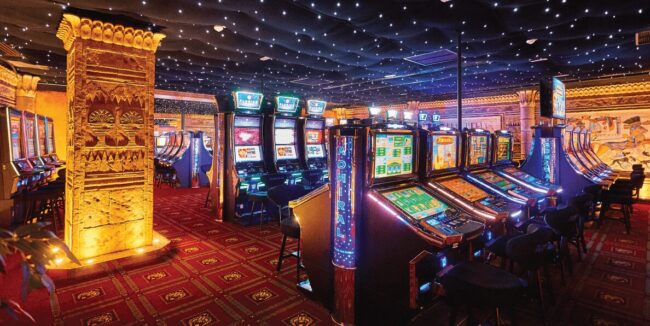
The Czech Republic has a healthy history of casino music and its evolution. With new casino online sites also embracing this musical heritage, more players can experience these unique traditions virtually. Its interaction with broad gambling culture at the early stages handles its growth and development. The Czech Republic has always had a rich heritage, which includes unique musical traditions that became more famous after its dissolution from Czechoslovakia in 1993.
A prominent feature of the Czech music scene for gambling includes classic tunes. It has two main elements, differentiating between the famous jazz and regular European flavour. The history moves from Beethoven’s symphonies to modern-era composers.
The music related to the Czech lands of Moravia and Bohemia spreads into six parts. It includes Classical, Renaissance, Baroque, Middle Ages, Romantic, and Modern eras. However, the best casino songs often revolved around the classical genre.
While there was a bit of European influence, composers like
- Bedřich Smetana
- Antonín Dvořák
- Jan Hammer, etc.,
Made considerable contributions to introducing local sounds to the gambling parlors. The communist era of 1948-1989, which lasted until the Velvet Revolution in 1989, saw only the promotion of local songs at casinos.
The government banned all Western influences. However, jazz, pop, and rock’n’roll were popular at private venues and underground illegal gambling businesses. It continued until the early 19th century.
From the 1990s, when communism fell, the country saw the cultural rebirth of casino music. Players became more introduced to Western genres, offering enough musical preferences. Pop, electronic music, rock, etc., became highly popular. More offers delivered translations of famous tunes into local languages, especially Bohemian.
The evolution is responsible for introducing electronic dance music and other similar genres into the Czech gambling market. Several casinos began diversifying their entertainment offers, including live and classic music catering to the younger and more active generation.
American Beats: The Influence of Las Vegas and Beyond
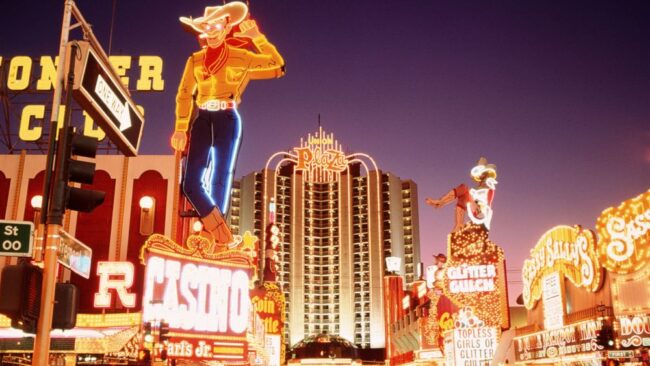
American casino music became famous with international influence when Nevada legalized gambling. Las Vegas is a major city in this state and remains the center for entertainment, shopping, nightlife, and gambling. Also known as Sin City, it hosts many casinos and resorts, making it popular.
While Las Vegas had a slow start to development, entertainment and music made it relevant in a short time. Today, it still serves as the ideal wedding destination for many people. One common reason for its popularity is the fantastic music settings.
The earliest recordings of the movement began with live performances from Liberace, a pianist and raconteur. Rock’n’roll took the main stage, allowing Elvis Presley to take the leadership spot. Other names like Frank Sinatra promoted the Rat Pack, setting the stage for global influence. Here are some of the casinos that were influential in offering music for gambling:
- Paris Las Vegas
- Caesars Palace
- The Bellagio
- Wynn Las Vegas
- The Flamingo
- The Venitian
- The Cosmopolitan, etc.
However, New Orleans and San Francisco are worth mentioning in the export of American beats overseas. The post-war era offered a shift in casino music. Different sounds like jazz and swing became the main soundtrack of the gambling floor.
Moreover, electronic dance music has played a significant role in influencing the global gambling market. Several rock and roll casino floors offering upbeat tunes became popular across parts of Europe. It also played a massive role in developing gambling worldwide, including South America.
British Tunes: The Class and Elegance of England’s Casino Music
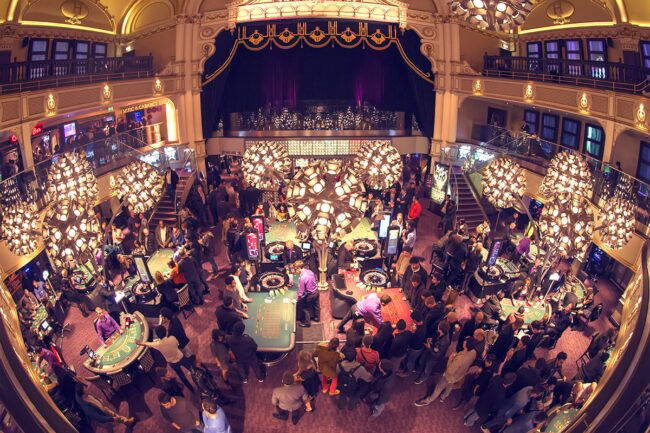
Many casinos in the United Kingdom have tested through samples of music genres. The idea was to find the right option to intrigue patrons and motivate them to spend more. It has evolved from a background feature to an essential part of the gambling experience.
Several tunes like the calming Norah Jones’ voice and the energising “The Rolling Stones” all have features in the England casino music scene. Others also wield influence, like pop, classical, jazz, pop, rock, and electronic. They tell different sides of British culture, especially when trying to appeal to a particular audience.
While classical music is present in America, the Czech Republic, and other parts of Europe, it differs in Britain. It offers a soothing experience away from the adrenaline pumps. You could find a Beethoven symphony as a backdrop. Its striking difference is how it tells how some British players prefer a quiet atmosphere to gambling.
Other tunes are also present, serving as casino live music for entertainment. Jazz music, an import from America, provides a mix of sophistication and class. It offers a distinct role for private lounges and gaming rooms. Top names like Ella Fitzgerald and Miles Davis were famous for their iconic sounds, offering an excellent ambience.
While there are rock, pop, and electronic dance genres, British casino music differs from other countries by the atmosphere. The edits to these sounds are to ensure a more calming and relaxing environment. Hence, while you may find pockets of iGaming sites across Britain with adrenaline-pumping tunes, the numbers are smaller compared to other countries.
The Psychology of Sound: How Casino Music Affects Gamblers’ Choices

There have been several studies that researched how music affects gambling behaviour. Many casino operators now understand this advantage and use it to leverage players to spend more time. An analysis by the Journal of Gambling Issues in March 2005 says that music on casino bands and slot machines could produce impressive formations. It often influences what game a customer plays or which lounge the patron will frequent.
Game Tempo Impact
Casino music plays a role in shaping a game’s tempo. Numerous operators use it as a strategy to influence decision-making plays. The song type could either slow down or increase the pace.
Decision-Making Influence
Although music may be for entertainment, it could also influence a player’s decision. Various research studies indicate that it could affect a person’s choice, especially for gambling. It goes ahead to sustain a gamer’s engagement with a machine or table.
For instance, if an individual is on a losing streak, the sounds from the background can sway his decision. It can boost morale to keep on playing. Alternatively, it could provide the courage to stand up and walk away.
The Future of Casino Music: Emerging Trends and Digital Innovations
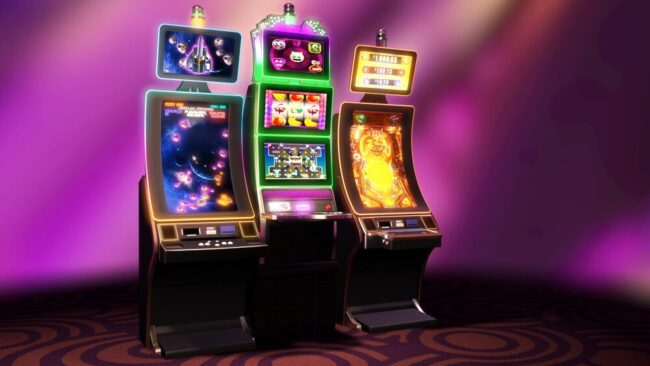
With online gambling becoming the face of casinos, the evolution of music is moving fast. Traditional casinos are giving way to internet variants, creating a situation where players no longer gather at a venue to play games. Hence, operators and businesses can apply digital tools to improve customer experiences.
Popular technologies are making this possible. For instance, AI is already developing a package allowing casino music to match players’ preferences. Most operators make considerable investments to maximize soundtracks’ leverage and increase returns.
This comes from studying data on players’ gambling patterns, including betting style and game choices. Some popular jazz casino online sites provide a pure blend of soundtracks for individual customers. Each account gets a specific tune, including a change in tempo and style to boost the experience.
The changes to casino music flow could impact the gambling industry shortly. Besides the apparent effect of boosting a player’s experience, it amplifies the psychological effects. It creates an immersive package to give that maximum offer, allowing players to bet more and spend longer.
One consideration which analysts have regarding these changes is the risk of irresponsible gambling. While EDM electronic music gives the feel of more excitement, it is essential to use caution to provide policies that reduce excessive betting. Hence, there is a rise in casino soundtrack regulations, among other areas.
Conclusions
Casino music has a unique origin, especially as it is as old as entertainment. Its history begins in America, particularly in Las Vegas, Nevada, which often doubles as a wedding destination. This location is responsible for developing and influencing different sounds. Options like jazz, rock’n’roll, pop, and electronic music now get international recognition.
European countries like the Czech Republic have their unique history. While influential Western sounds are present, the nation offers a pure blend of native tunes at gambling parlors. The United Kingdom often differentiates itself from many countries, offering unique casinos with particular sounds.
Music remains an essential feature for creating a top experience. Primary among them is the offer to influence decisions, a factor that operators use to their advantage. The future of casino music remains positive, especially with rising tools that help tailor each player’s preferences. More technologies mean a better immersive environment to boost adrenaline and influence decisions.
